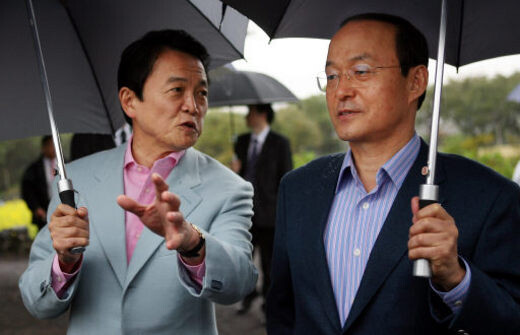hankyoreh
Links to other country sites 다른 나라 사이트 링크
With S.K.-U.S. FTA handshake, China, Japan weigh options

Japan and China are keeping a close eye on the recently forged South Korea-U.S. free trade agreement (FTA), with Tokyo’s concerns largely economic and Beijing’s related to the geopolitics of East Asia.
Relating to the ROK-U.S. FTA, which was agreed upon on the afternoon of April 2, Seoul time, Japan’s major media expressed a will to push forward with the country’s own stalled trade negotiations with Korea.
In an April 3 editorial, Nihon Geizai Shimbun noted, "Considering the Korea-U.S. FTA, which was achieved amidst outrageous anti-U.S. demonstrations of South Korean farmers, Japan and South Korea also will be able to overcome obstacles." Asahi Shimbun in an editorial said, "After concluding the FTA negotiations with the United States, South Korea may have a will to do the same with Japan next time." The newspaper urged Tokyo to reach an agreement with its neighbor, saying, "This is a golden opportunity to resume negotiations."
Seoul and Tokyo held six FTA negotiations from December 2003 to November 2004. However, the negotiations were suspended due to former Prime Minister Junichiro Koizumi’s repeated visits to Yasukuni Shrine, as well as problems regarding the opening of the Japanese agricultural market and abolishing tariffs by South Korea on imports in the manufacturing sector.
In a press conference on April 3, Japanese Prime Minister Shinzo Abe expressed a strong will to resume trade negotiations with South Korea, saying, "It is important for the two nations to make efforts." Regarding the possibility of signing a U.S.-Japan FTA, "We should view the FTA as a future task, bearing the size of the two countries’ economies in mind," showing a positive position about negotiations with Seoul and a more prudent position about those with Washington.
The Japanese Foreign Ministry also welcomed the pact: "We expect the ROK-U.S. FTA to bring economic development to Korea and to Northeast Asia, as well."
Meanwhile, China has focused on the geopolitical effects of the ROK-U.S. FTA on Northeast Asia. Beijing thinks the FTA between Seoul and Washington was a result of the strategic interest of the two nations, which are seeking to check China’s emerging political and economic influence, said a diplomatic source, asking to be unnamed. The source added that Beijing seemed to be raising concerns that the FTA between Korea and the U.S. would further strengthen the two nations’ alliance while reducing China’s influence on Northeast Asia.
With the S.K.-U.S. FTA agreed upon, it is highly possible that China will become more positive toward agreeing upon an FTA with Korea. The two countries are taking part in joint industry-government-academic research projects, a precursory step for FTA negotiations.
In relation to a future Korea-China FTA, China is taking a positive stance, whereas Korea remains cautious toward the idea. During the first meeting of the joint industry-government-school research projects on March 22, Korea conveyed the message to China that Seoul would prefer a comprehensive FTA, including goods, services, investment, intellectual property rights, and government contract procurement sector rights, and that the two nations should take time to make a decision on sensitive items such as agricultural and marine products. China in turn took the position that it wanted to establish a channel between the two nations’ industries in order to overcome the potential impact of such a trade deal on China’s sensitive industries, such as automobiles, steel, chemicals, and heavy machinery.
Please direct questions or comments to [englishhani@hani.co.kr]
Editorial・opinion
![[Column] Has Korea, too, crossed the Rubicon on China? [Column] Has Korea, too, crossed the Rubicon on China?](https://flexible.img.hani.co.kr/flexible/normal/500/300/imgdb/original/2024/0419/9317135153409185.jpg) [Column] Has Korea, too, crossed the Rubicon on China?
[Column] Has Korea, too, crossed the Rubicon on China?![[Correspondent’s column] In Japan’s alliance with US, echoes of its past alliances with UK [Correspondent’s column] In Japan’s alliance with US, echoes of its past alliances with UK](https://flexible.img.hani.co.kr/flexible/normal/500/300/imgdb/original/2024/0419/2317135166563519.jpg) [Correspondent’s column] In Japan’s alliance with US, echoes of its past alliances with UK
[Correspondent’s column] In Japan’s alliance with US, echoes of its past alliances with UK- [Editorial] Does Yoon think the Korean public is wrong?
- [Editorial] As it bolsters its alliance with US, Japan must be accountable for past
- [Guest essay] Amending the Constitution is Yoon’s key to leaving office in public’s good graces
- [Editorial] 10 years on, lessons of Sewol tragedy must never be forgotten
- [Column] A death blow to Korea’s prosecutor politics
- [Correspondent’s column] The US and the end of Japanese pacifism
- [Guest essay] How Korea turned its trainee doctors into monsters
- [Guest essay] As someone who helped forge Seoul-Moscow ties, their status today troubles me
Most viewed articles
- 1[Column] The clock is ticking for Korea’s first lady
- 2Hong Se-hwa, voice for tolerance whose memoir of exile touched a chord, dies at 76
- 3After 2 months of delayed, denied medical care, Koreans worry worst may be yet to come
- 4[Column] Has Korea, too, crossed the Rubicon on China?
- 5US overtakes China as Korea’s top export market, prompting trade sanction jitters
- 6Samsung barricades office as unionized workers strike for better conditions
- 7All eyes on Xiaomi after it pulls off EV that Apple couldn’t
- 8[Correspondent’s column] In Japan’s alliance with US, echoes of its past alliances with UK
- 975% of younger S. Koreans want to leave country
- 10[Correspondent’s column] The US and the end of Japanese pacifism